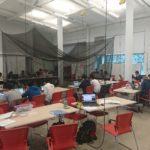ME 136 / ME236U: Introduction to control of unmanned aerial vehicles [Fall]
This class aims to introduce students to Unmanned Aerial Vehicles (UAVs), from a feedback controls perspective. In addition to the theoretical component, students may enroll in a simulation or hardware laboratory. Students will learn the theory necessary to model, understand, and design a controller for a UAV. Topics covered in the lecture will include: modeling of a three-dimensional rigid object; descriptions of orientation; mass moments of inertia; important forces and moments acting on a UAV; aerodynamics of a thin aerofoil; aerodynamics of a propeller; and typical control strategies.
During the class’s associated labs, students will implement a state estimator and then feedback control to stabilize the vehicle (all programmed in C++, flashed onto the UAV’s microcontroller). At the end of the semester, students compete to see who’s system is best able to reject external disturbances.
The class is open to interested engineering students from any major, with the main prerequisite being an introductory controls lecture (e.g. ME132). The course is cross-listed: ME136 is aimed at undergraduates, and ME236U aimed at graduate students. The courses share the lecture slots, but have distinct exams and homework requirements.

ME 231B: Experiential Advanced Control Design II [Spring]
This course is focused on systems with uncertainty, especially on model-based techniques. Topics covered include:
- Introduction to stochastic systems, random variables, PDFs
- Estimates and PDFs
- Bayes’ theorem
- Bayesian tracking over discrete state systems
- Least squares for dynamic systems
- The Kalman filter (as optimal state estimator, and as best linear estimator)
- Observability, and the steady-state Kalman filter
- Nonlinear estimation: extended Kalman filter, unscented Kalman filter, the particle filter
- Optimal control of deterministic systems: Linear quadratic control
- Optimal control of uncertain systems: Linear quadratic gaussian control
- Time discretization and implementation of continuous-time designs
- System identification, parameter adaptation algorithms
ME 104: Engineering Mechanics II [Spring 2019]
This course teaches students the fundamentals of analysis and modelling of dynamic systems. We approach the subject in a formal way, with an emphasis on deriving results from first principles.
